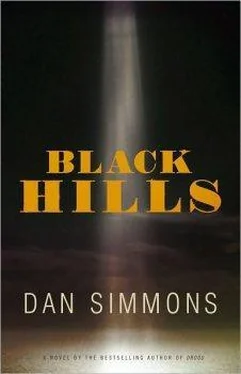And he had not. He had been as good as his—or Robert Sweet Medicine’s—word.
After ten months of training, the 91st Division was shipped first to England and then to France in the late summer of 1918. The little blue unfolding army-issued envelope-letters with Robert’s tight script filling each page arrived weekly, without fail, just as they had for all his years away at school.
August 1918 was filled with even more training near Montigny-le-Roi.
Paha Sapa bought a large map which he affixed to the kitchen wall.
In September, Robert’s division marched to the front and the letters began listing addresses such as Void, Pagny-sur-Meuse, and Sorcy-sur-Meuse, and Sorcy.
Paha Sapa bought a pack of children’s crayons and made red and blue circles on the wall map.
That September and October, Robert and his division fought in the reduction of the German St.-Mihiel salient, then in the ferocious Meuse-Argonne offensive, then regrouped in places with such horribly familiar names as Flanders and Ypres. Robert wrote of amusing little incidents in the trenches, about the sense of humor of the western-states young men he spent time with, of the habits and manners of the French and Belgians—on October 26, in a place called Chateau-Rumbeke, King Albert of the Belgians phoned the division’s headquarters to express his welcome to the Americans. Robert reported that although it was a rainy, hot, steaming, flea-bitten, rat-biting night in the Allied trenches, the men of the 91st were thrilled to death by the king’s welcoming phone call.
Later, Paha Sapa would learn how terrible the fighting in the so-called Ypres-Lys Offensive from October 30 to November 11, 1918, really was. Robert had been in the midst of the worst of it. His commanding officer wrote a letter of praise and commendation to go along with three medals that the private-promoted-to-sergeant would receive in that time. He was not touched by shell or wire or bullet or poison gas or bayonet.
At eleven a.m. on the eleventh of November 1918, an armistice was signed in a railroad car at Compiègne and a cease-fire went into effect. All of the opposing armies began to pull back from their front lines. The last Allied soldier to die on the Western Front was reported to be a Canadian named George Lawrence Price, killed by a German sniper at 10:58 a.m. that day.
The 91st Division moved back into Belgium to wait for demobilization and shipment home. Robert wrote of how beautiful the early-winter countryside was there, despite the ravages of four years of war, and how he was seeing a young lady in the village during his free time, communicating with her and her parents and sisters through his high school French.
What was later called the Spanish flu first broke out at Fort Riley, Kansas—General Custer’s and Libbie’s old stomping ground—and soon spread around the world. A strange mutation of a more common influenza virus, it was most deadly among the young and physically fit. The actual number of people killed by the influenza virus could never be certain, but some estimated up to 100 million people—a third of the entire population of Europe and more than twice the number of all the soldiers killed in the Great War.
Robert died of pneumonia—the most common cause of death among the young with this influenza—in an army hospital near his billet south of Dunkerque and was buried in the Flanders Field American Cemetery along with 367 of his comrades near the village of Waregem in Belgium.
Paha Sapa received the news on Christmas Eve 1918. Two more letters, following their slower and more circuitous route, arrived from Robert after the death notice, each letter celebrating the beauty of Belgium, his delight at seeing the young (unnamed and possibly not the same) lady, the pleasure he was receiving from the books he was reading in French, his profound gratitude just for surviving the war while suffering nothing worse than a slight cough he was fighting, and his eagerness to see his father when the 91st Division demobilized in earnest in February or March.

PAHA SAPA KNOWS that something is horribly wrong just by the sound of the first explosion.
The five charges he set for the demonstration explosion, one quarter of a stick of dynamite each, buried in deep holes in the raw rock beneath the slight rim ridge running from Washington past Jefferson, have been primed to detonate in such rapid series that they will sound almost simultaneous to the onlookers below—BAM,BAM,BAMBAMBAM. The demonstration blast was designed to make some enjoyable noise and kick up a maximum of granite dust with the minimum of loose stone actually moved through the air.
But this explosion is far too loud. It feels too serious, the vibration flowing into Paha Sapa through the rock beneath him and through the curved vertical stone of Abraham Lincoln’s cheek and vibrating his teeth and bones and aching internal organs.
And it’s too solitary.
Paha Sapa looks up to see his worst fear realized.
This is the “look up” blast he’s buried just to the right of George Washington’s cheek and it’s taken a large gouge out of the cheek itself.
Paha Sapa looks down and sees the wrong detonator, the gray wires rather than black leading from it. He hears rather than sees the commotion in the sound-shocked side of Doane Mountain below as the newsreel cameras swing on their tripods and as everyone from the youngest child to the president of the United States raises a shocked gaze to the area of the mountain where several score tons of granite have just been lifted into the air in a mighty cloud of dust.
There’s nothing Paha Sapa can do. The charges have been rigged in deliberate series, but the electrical charge has already been sent to the fuses of all twenty-one detonators.
He has not meant for this to happen yet. Long Hair’s ghost distracted him just when…
The second, third, fourth, and fifth blasts go off simultaneously. George Washington’s right eye socket explodes outward and the first president’s brow cracks, slumps, and falls, taking the aggressive beak of granite nose with it.
The third blast has taken the mouth and chin and launched Model T–sized chunks of granite far, far out into the thick August air. The fourth explosion blows Washington’s right cheek, what was left of his mouth, and part of the left brow into the air. The fifth blast brings the teetering debris of the previous four sliding and crashing down.
Chunks of rock larger than Paha Sapa strike and scar Abraham Lincoln’s face above and below and beside the Lakota powderman’s partially shielded roost. Below, people are screaming, the screeching microphones and loudspeakers still echoing the reality.
Jefferson flies apart more efficiently than Washington, which is appropriate for the third in line in any profession rather than the first.
But most of the five explosions here happen behind the huge flag that is still draped there, making the Jefferson Head seem like a firing-squad victim who’s chosen a large blindfold.
Paha Sapa didn’t want this to happen when the flag was still in place. It’s a major reason why he was willing to wait.
My country, Father. And yours. We’re at war.
Paha didn’t believe that then and doesn’t believe it now, when the country is not at war, but he had no intention of destroying the giant flag so patiently sewn by little old ladies and high school girls in Rapid City.
Incredibly, the thin fabric actually muffles the explosions a tiny bit. Then, faster than the eye can follow, the giant flag is torn to shreds as ton after ton of pulverized rock flies outward and upward in an expanding cumulus cloud of gray dust and flame.
Читать дальше













